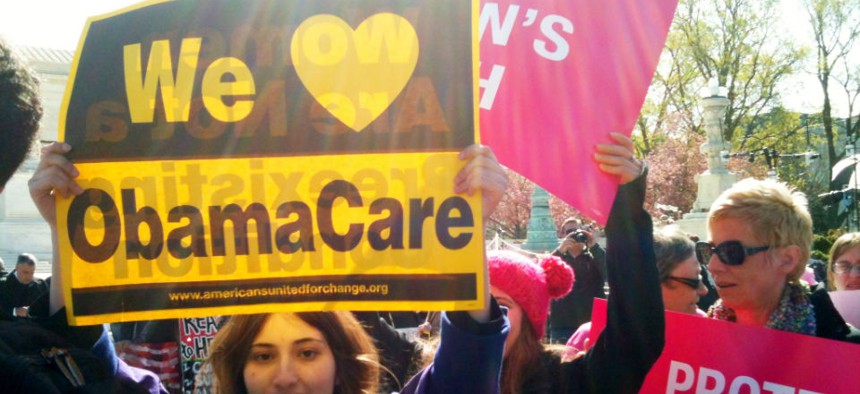
Women rally in support of Obamacare in front of the Supreme Court in 2012. Flickr user LaDawna Howard
Democrats Are (Slowly) Learning to Love Obamacare
Democrats are getting more comfortable talking about the law, but don’t expect them to make it a central part of their campaigns.
Democrats won't be mounting a big political offensive around the Affordable Care Act any time soon, but they're beginning to test the pro-Obamacare waters.
Heading into the 2014 midterms, Republicans continue to hold a clear advantage in the politics of Obamacare. And even if the tide does ultimately shift for the law, it almost certainly won't happen by November. Still, there are signs that Democrats are slowly becoming more confident talking about the health care law, or at least parts of it.
"There is a palpable comfort that didn't exist as recently as six months ago," said Chris Jennings, who worked on health care strategy in both the Clinton and Obama administrations. "I think we're in transition, moving from a defense to an achievement strategy."
If that transition is happening, though, it's still in its very early phases.
Democratic strategists cautioned against reading too much into the trickle of pro-Obamacare messaging some candidates have embraced. The health care law is finding a place in Democrats' campaigns often as a byproduct of some other political need, they said, not because of a broader strategic shift within the party.
They downplayed, for example, the recent ad in which Mark Pryor of Arkansas—one of the Senate's most vulnerable Democrats—highlighted popular provisions of the Affordable Care Act. The ad shows Pryor, appearing alongside his father, discussing his own bout with cancer and saying he "helped pass a law that prevents insurance companies from canceling your policy if you get sick, or deny coverage for preexisting conditions."
Many liberal pundits were ecstatic about the spot, proclaiming that Democrats finally understood how to win on Obamacare. But Democratic strategists said that wasn't the most important element; the ad is "very much about Mark telling his personal story," and not about making a pro-Obamacare argument, said Justin Barasky, a spokesman for the Democratic Senatorial Campaign Committee.
"This is not a response ad by any means; this is a bio ad, this is an ad about who he is. They would have run this ad regardless of what the politics of ACA are," a Democratic strategist said.
Similarly, Sen. Kay Hagan has made the law's Medicaid expansion a key component of her bid for reelection in conservative North Carolina, which has rejected the coverage expansion.
Democrats' emerging confidence comes as the law is taking a smaller role in Republicans' attack ads. GOP candidates and allies in a handful of states—including North Carolina—have shifted from an all-Obamacare-all-the-time advertising strategy to one that incorporates Obamacare into a larger message about jobs and the economy.
All those trend lines are pointing in the same direction, but that doesn't mean Democrats have suddenly won the upper hand on Obamacare.
First of all, it might not work. Pryor and Hagan have both backed into health care: He embraced it as a way to tell a personal story, and Hagan's focus on Medicaid is one that should resonate with the Democratic base in her state. But there's still a pretty good chance that Pryor and Hagan—like many of their colleagues who also voted for Obamacare—will lose.
And despite the excitement Pryor's ad stirred up on the left, Jennings said he doesn't expect to see a rush of Democrats taking the same tack. Candidates have other issues they'd rather focus on, he said, and there's "some health care fatigue out there"; after five years of bitter partisan fighting about Obamacare, polls show most people are ready to move on.
The same polls also show that the health care law remains unpopular—and poorly understood.
In the most recent monthly tracking poll from the Kaiser Family Foundation, the law's favorability rating held steady at 39 percent, while its unfavorable rating rose to an all-time high of 53 percent. The same survey has found that Republicans' opposition to the law is much more passionate than Democrats' support for it. And even though the public at large wants Congress to fix the law rather than repeal it, a majority of Republicans said they'd prefer to keep the focus on repeal.
Those attitudes are so entrenched that Democrats may never hold an advantage on Obamacare. But polls also show that voters like many specific elements of the law—which is probably why Pryor didn't mention it by name when he described one of its central provisions.
In Kaiser's March poll, the most recent to survey individual components of the law, 70 percent of voters said they approve of a policy requiring insurers to cover people with preexisting conditions. Just 54 percent, though, knew that policy was part of Obamacare. Likewise, in the most recent survey, just 37 percent knew that the law offers consumers a choice among private insurance plans.
That disconnect has dogged Democrats throughout the Obamacare debate, and it helps explain why Republicans' job is so much easier than Democrats'. But now that the law's most popular provisions are finally in place, Jennings said, Democrats can start to follow the advice former President Clinton has been offering: Frame the debate around Republican attempts to take away real-life benefits.
"Time is definitely on the side of the ACA. As time goes by, more people benefit.… It isn't a theoretical discussion any longer," Jennings said.
Alex Roarty contributed to this article.
(Image via Flickr user LaDawna Howard)
NEXT STORY: House Hires Lawyer for Obama Lawsuit






